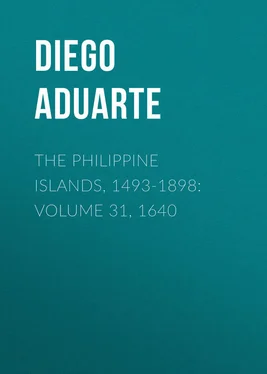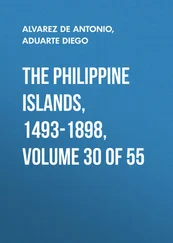Diego Aduarte - The Philippine Islands, 1493-1898 - Volume 31, 1640
Здесь есть возможность читать онлайн «Diego Aduarte - The Philippine Islands, 1493-1898 - Volume 31, 1640» — ознакомительный отрывок электронной книги совершенно бесплатно, а после прочтения отрывка купить полную версию. В некоторых случаях можно слушать аудио, скачать через торрент в формате fb2 и присутствует краткое содержание. ISBN: , Жанр: foreign_antique, foreign_prose, Историческая проза, на английском языке. Описание произведения, (предисловие) а так же отзывы посетителей доступны на портале библиотеки ЛибКат.
- Название:The Philippine Islands, 1493-1898: Volume 31, 1640
- Автор:
- Жанр:
- Год:неизвестен
- ISBN:http://www.gutenberg.org/ebooks/42399
- Рейтинг книги:5 / 5. Голосов: 1
-
Избранное:Добавить в избранное
- Отзывы:
-
Ваша оценка:
- 100
- 1
- 2
- 3
- 4
- 5
The Philippine Islands, 1493-1898: Volume 31, 1640: краткое содержание, описание и аннотация
Предлагаем к чтению аннотацию, описание, краткое содержание или предисловие (зависит от того, что написал сам автор книги «The Philippine Islands, 1493-1898: Volume 31, 1640»). Если вы не нашли необходимую информацию о книге — напишите в комментариях, мы постараемся отыскать её.
The Philippine Islands, 1493-1898: Volume 31, 1640 — читать онлайн ознакомительный отрывок
Ниже представлен текст книги, разбитый по страницам. Система сохранения места последней прочитанной страницы, позволяет с удобством читать онлайн бесплатно книгу «The Philippine Islands, 1493-1898: Volume 31, 1640», без необходимости каждый раз заново искать на чём Вы остановились. Поставьте закладку, и сможете в любой момент перейти на страницу, на которой закончили чтение.
Интервал:
Закладка:
Chapter XLII
A more detailed account of the virtues of the servant of God, Don Fray Domingo de Salaçar
The conformity of the good bishop with the divine will, and his desire to be approved before the pure eyes of that heavenly Lord with whom he always desired most intimately to unite himself, and the knowledge that he could not attain this approval without striving with all his heart to imitate His virtues, and by means of them to acquire something of His likeness, made the bishop endeavor constantly with great solicitude to attain these virtues – although to attain them it was necessary for him to strive manfully to conquer his own nature; in so far as it was opposed to them; and to multiply, in order to attain this victory over himself, penances and austerities, to the end that his nature might surrender and be subjected. The virtue of patience, which is in all circumstances very desirable, and no less difficult to acquire and maintain, was that which the bishop most needed, for at every step occasions offered themselves for the exercise of this virtue. Since he was by nature wrathful and hot-tempered, and was always engaged in defending the right, it cost him much to control himself and to be patient. However, he had so restrained himself and so become lord of his nature, that he did not permit it to display itself. This was not only in cases where he had time for consideration and for preparation, but in those sudden and unexpected accidents in which those who are wronged are accustomed to lose control of themselves, if the virtue of patience is not well rooted within their souls or has not reached perfection. He was often obliged to hear many insulting words from soldiers who were angry because he had interfered with their excesses; but he kept silent, and walked on as if he had not heard them, attending to his business without taking any account of things which did not belong to it. Since the Indians suffered from the abuses which were inflicted upon them, he went in one day to speak on their behalf to the governor who was then in office. He was not permitted to proceed with his business without hearing many insulting words from the governor, who even put his hands upon his breast and gave him a push. The bishop did not change countenance; and, following the counsel of St. Paul, who bids us give place to wrath, he left the hall that he might not more inflame the wrath of this man. After a while, when he thought it was time, he went in again, and with great serenity of countenance and with gentleness of heart and words, he said to him: “Bend your knees, because my heart does not permit me to leave you under so heavy a condemnation;” and he added: “By virtue of a brief of the Supreme Pontiff which I have for this purpose, I absolve you from the most dreadful excommunication which you have incurred.” When he had done this, he went out again; and even commanded the cleric who accompanied him not to reveal to anyone what had happened, under penalty of excommunication. On another occasion another ecclesiastic whom he rebuked said to him, very angrily: “How badly you treat me, though you know that I am better than you are.” The bishop answered, with great calmness, that he was delighted to have in his bishopric so honorable a person. With this gentleness he suffered the blows of those who exercised his patience, leaving his cause to God, as God commands us. The Lord assumed the care of his cause, and rigorously chastised those who spoke evil of him. Some people wrote letters against him to España; and, before the answer came back, they were called upon to give their answer before the tribunal of God, ending their lives in sudden and dreadful death. He took great pains to preserve his chastity and the purity with which he was born, esteeming it highly like a precious jewel, and performing many penances to defend it from the assaults of the enemies who hated its beauty and ever strove to destroy it. Two priests have borne witness that he was a virgin: father Fray Diego de Soria, late bishop of Nueva Segovia, to whom he made a general confession in his old age, at the time when he was about to embark on the last voyage which he made to España. The other priest was a clergyman to whom he had confessed more than two hundred times, and who was well acquainted with the state of his conscience. This priest confirmed his testimony with an oath. In spite of this, the world is such that the chaste bishop found it necessary to defend himself against accusations in regard to this matter, and to bear testimony to the purity of his own conscience. At a public celebration of the holy sacrifice of the mass, with the divine sacrament in his hands, he affirmed, because necessity required it, that he hoped this celestial food might be his eternal damnation if he was conscious of any fault of such a kind. If those who spoke against him in this matter had been only laymen, angry because they had been corrected and forcibly drawn from such vices, and mad with passion – for such persons will not forgive those who are most holy – if this accusation had proceeded from such as these, it would have been matter for sorrow, but would not have been intolerable; but there were even some ecclesiastics who saw that the bishop took great pains to seclude abandoned women, and who ventured to make themselves defenders of these persons of disorderly life. They declared that a man who gathered in so many of these women of evil life (some of them handsome), shut them up, and heard them at their trials, would be sure to put out his hand and select those who pleased him. This reached the ears of the bishop; and the vengeance which he took was to commend them to the Lord in prayer with all his heart – pitying them as being persons who were really worthy of compassion; since, without comparison, the harm that one who speaks evil does to himself is greater than the harm done to him who is wronged. The Lord heard these pious prayers, and touched their hearts. They acknowledged the evil that they had spoken, and very repentantly came to beg his pardon, at the episcopal residence, in the presence of those who lived there. The bishop received them with open arms and with abundance of tears, and had them that day as companions at his table. The vengeance which the saints desire to take upon their enemies is, to have them repent for their faults when they become conscious of their errors.
He was very compassionate, and felt the utmost pity for the sufferings of his neighbor. Of this a marked example was given on the voyage from Nueva España to Manila. There were in the same ship more than twenty Augustinian religious, and, while they were at sea, their water gave out. This is one of the greatest hardships which may be suffered on a voyage. The bishop took pity upon them; and, although he had not enough to supply the necessity of so many, he preferred suffering with the others to seeing them suffer while he was comfortable. Accordingly he offered them the opportunity to drink from what he carried in his martabana , which is a large jar holding twenty cantaros 7 7 Cantaro (from Latin, cantharus ): the name of a large earthen or metal receptacle for liquids, hence for the amount contained in it; also, a measure for wine, varying in different parts of Spain. The cantaro (or alquiére) of Portugal is equivalent to nearly 2⅕ or 3⅓ U. S. gallons in Lisbon and Oporto respectively.
of water. Their need would not permit them to refuse what was thus offered them voluntarily; and, though they all drank of it, the Lord was pleased that it should last until they landed on the islands, as the servant of God had prayed. It is no new or rare thing for the Lord to multiply food and drink, that it may not be lacking to those who bring themselves to need out of pity. This same virtue caused the bishop to watch over this municipality of Manila, by taking care that in the houses of the fathers of the Society [of Jesus] there should be religious to give instruction in profitable learning to those who desired to study it. That this might be made permanent, and that there might not be any failure in it, he brought it about that his Majesty gave command that the religious should receive an allowance to be spent upon the teachers. The answer of his Majesty is contained in the royal decree given at Barcelona the eighth [ sic ] of fifteen eighty-three. The document runs as follows: “To the reverend father in Christ, Fray Domingo de Salacar, bishop of the Philippinas Islands. Three letters from you have been received from my Council, etc. Considering the good report which you give of the great results which have followed and which are likely to follow from the maintenance of the Order of the Society of Jesus, and considering that to this end it is necessary that the Society should receive from me what is needed for the support of the religious who desire to teach and instruct in Latinity, sciences and good morals, those who come to them, I have, until some one shall come forward to undertake this business, granted the decree enclosed. In pursuance of this decree, the president of the Audiencia and you will together determine how this object may be carried out,” etc. From this same spirit of compassion arose the benevolence which he displayed toward all the natives by building a hospital in Manila in which sick Indians might be cared for. He gave so much energy to this that he not only was the chief person who concerned himself with it, but he gave the first and the chief contribution to establish and endow it. At the very beginning of the hospital he did something worthy of his virtue and prudence. The sick in this hospital were cared for by religious of the order of the seraphic father St. Francis, and particularly by a brother named Fray Juan Clemente. The infirmity for which they were ordinarily treated was buboes, which are very frequent on these poor Indians because they ordinarily have to walk in the water in their grain-fields. 8 8 Referring to the cultivation of their rice, usually in fields more or less under water.
The brother had much to suffer with the Indian men, and still more with the Indian women, the care of whom was in general not very consonant with decency. On this account, the religious determined to give up this duty, and actually asked the bishop for permission to leave the hospital. The bishop, who was well acquainted with the conscience of Fray Juan, and who saw the reason for his unhappiness, encouraged and consoled him; and exhorted him not to give up, on account of these temptations, the good work and the service which he had begun there. He gave the brother holy and devout reasons for this, and finally said: “My son Fray Juan, fast for three days in the week; give yourself a discipline, and keep your hour of prayer. As for the rest, I will charge myself with it, and will take the responsibility upon myself.” The result was marvelous, for, because of the good advice which had been given him and the prayer which the bishop made for him, Fray Juan found himself so much consoled and changed that he no longer felt the least difficulty or disquiet in the world; and, as if he had cast all these difficulties upon another person, he no longer perceived them in himself. Yet before this he had found himself so much oppressed by them that, in order not to fall, he had desired to flee. In a case of this kind, to take flight is to conquer – but not so nobly as when the Lord puts forth His hand that His servants may handle such serpents as these without being harmed by them, which happened in this case as the result of the prayer of His servant the bishop.
Интервал:
Закладка:
Похожие книги на «The Philippine Islands, 1493-1898: Volume 31, 1640»
Представляем Вашему вниманию похожие книги на «The Philippine Islands, 1493-1898: Volume 31, 1640» списком для выбора. Мы отобрали схожую по названию и смыслу литературу в надежде предоставить читателям больше вариантов отыскать новые, интересные, ещё непрочитанные произведения.
Обсуждение, отзывы о книге «The Philippine Islands, 1493-1898: Volume 31, 1640» и просто собственные мнения читателей. Оставьте ваши комментарии, напишите, что Вы думаете о произведении, его смысле или главных героях. Укажите что конкретно понравилось, а что нет, и почему Вы так считаете.












